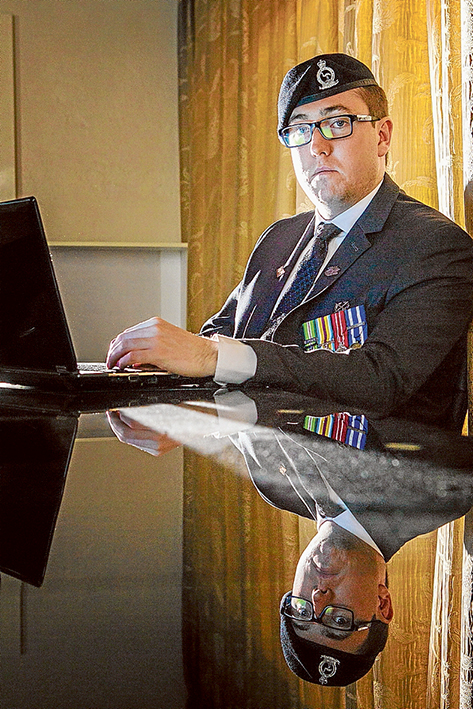
WHILE Australians pay their respects to the World War I fallen during this year’s Anzac centenary the war against terrorism continues in foreign fields and deserts.
Aaron Healy is one of those who served and the Chelsea resident’s journal detailing his experiences during 112 days deployed in Afghanistan in 2011 have been accepted in to the Australian War Memorial in Canberra.
The former Trooper’s journal, written using a laptop, vividly chronicles the battles, danger and – at times – boredom that is a soldier’s lot during wartime.
The journal was the first of two from the Afghanistan campaign – alongside army comrade Stephen Gavin’s – to be accepted into the Australian War Memorial’s archives.
The 26-year-old was stationed in Uruzgan Province and found there was a culture shock for both Australian troops and the Afghan locals.
“The locals were very mistrusting and weren’t really sure who we were or what we were doing there,” Mr Healy said. “They had never really been breached by the outside world. They really had no idea about coalition forces. The Russians never made it to them during their occupation.”
Mr Healy’s battalion trained and mentored Afghan army volunteers during his tour of duty.
“They were interesting characters. Some of them can be a bit ‘Bananas in Pyjamas’ – they can be a bit silly and always making mistakes. Some of them took it really seriously and wanted to rebuild and stabilise their country.”
He could understand why some Afghan soldiers were less than enthusiastic about military life.
“It’s an impoverished country that hasn’t been stable since probably the 1970s and a lot of them have just joined up for three meals a day and pay. Their heart’s not in it. They don’t care. They just do what they have to not get kicked out.”
Drug use among Afghan volunteers was rife, Mr Healy said, with marijuana, heroin and opium readily available.
“Some of them were fantastic and really nice guys [but] some of them were Taliban insiders. They used to make phone calls and sell information when we left the base to tell the Taliban we’re leaving and what direction we were heading in.”
While on a reconnaissance mission, Mr Healy and his fellow soldiers came under attack by a sniper and, later that night, machine gun fire ripped into their temporary camp.
“We put as many rounds as we could into where they [the bullets] were coming from. We killed five of them.”
US Apache helicopters were called in to provide air support.
Uruzgan Province is home to the notorious “IED alley” and Mr Healy’s battalion regularly had to travel the gauntlet of the improvised explosive device strewn valley.
Twisted ‘trenches humour’ saw troops keeping a score of how many IEDs they stuck while out on patrol in heavily armoured vehicles.
“I only hit one IED over there,” Mr Healy said. “We were lucky that the bomb maker who put together that IED didn’t know his chemistry too well and he didn’t get the components right so when we hit it … it didn’t release the whole 15kg charge.”
After his Afghanistan deployment Mr Healy decided to leave the army. He had always wanted to join the army and enlisted at the age of 19 but decided six years was enough time in the armed forces.
It’s a good experience and a great adventure but I didn’t see it as a full-time career. I got pretty disgruntled with the army. You’re always just like a child getting led around.”
“I always had my mind set on joining up. Once I got there it’s not what you imagine it to be. It is what it is. I enjoyed my time and was happy to walk away once I’d felt I’d finished and achieved everything I needed to.”
Mr Healy still stays in touch with his former army comrades but has lost contact with Afghans he met during his deployment.
He often thinks about an interpreter – “a fantastic bloke” from “the birthplace of the Taliban” – who feared he and his family would be murdered if the Taliban found out he worked with the Australian Army.
Australian authorities should do all they can to repatriate those who helped troops in war zones, Mr Healy said.
“We owe it to them. Not all of them. Each one should be assessed on a case-by-case basis.”
His journal will be put on display on an electronic screen at the Australian War Memorial after the war in Afghanistan is over. About 400 Australian troops remain in Afghanistan and seem set to stay until at least the end of 2016.
First published in the Chelsea Mordialloc Mentone News – 13 May 2015